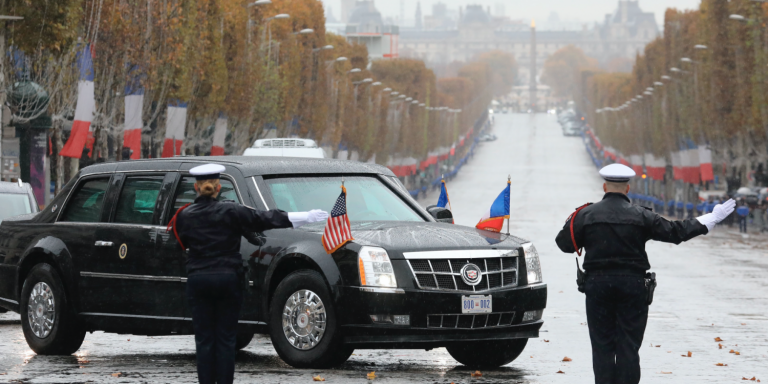INTELBRIEF
November 15, 2018
IntelBrief: Paris and the Prospects & Perils of a Post-American Order

- As the recent World War I centenary tribute in Paris foreshadowed, the world order may be shifting, with the contours of a ‘Post-American Order’ slowly taking shape.
- The defining characteristic of a post-American world would be multipolarity, with revisionist powers like Russia and China growing more assertive, near-peer adversaries like Iran and North Korea gaining in relative strength, and traditional allies in Europe and Asia reconsidering their relationships with Washington amidst American retrenchment.
- Still, despite the anomalous presidency of Donald Trump, largely considered to be an outlier in terms of American grand strategic tradition, the United States continues to maintain resilient institutions and remains a leader in most areas that matter—military, economic, and technological.
- It is still premature to begin speaking of a ‘Post-American Order,’ although continued hegemony is no fait accompli. Likely the United States will rebound from its current morass to reclaim its role as the leading promoter of global stability and defender of human rights, democracy, and free markets.
.
Just last weekend, world leaders gathered in Paris to mark the solemn one hundred-year anniversary of the end of WWI. The gathering was a ‘who’s who’ of more than 70 world leaders, including American President Donald Trump, France’s Emmanuel Macron, Germany’s Angela Merkel, Russia’s Vladimir Putin, and Turkey’s Recep Tayyip Erdogan, in addition to many others. While much of the American media coverage focused on Trump canceling a scheduled visit to the graves of fallen American soldiers due to inclement weather there were substantive happenings as well, including several heads of state offering a series of statements lauding global stability and world peace, while warning against the dangers of misplaced nationalism and populist rhetoric run amok. Many of the speeches seemed to be a direct rebuke to the Trump doctrine, —nationalism, protectionism, and xenophobic statements designed to gain domestic political support—which ironically were all components of what led to World War I.
A defining feature of a post-American world order would be a shift from a unipolar system to either a bipolar system featuring the U.S. and a rising China, or a multipolar system that included both Washington and Beijing, but also a collection of second-tier powers, such as Russia, the European Union, Japan and India. The aforementioned six powers account for more than half the world’s population, roughly 70% of global economic output, and approximately 80% of global military spending. A consequence of unfettered globalization is the rising importance of non-state actors, from transnational terrorist groups and non-governmental organizations to multinational corporations and private security contractors. A shifting international system could see the U.S. retrenching further than it already has, which would ultimately lead to more conflict. It is concerning that the U.S. has already begun to cede global leadership to China and other rising powers; pulling out of the Paris Climate Accord and the Trans-Pacific Partnership are moves that could further hasten the U.S.’ decline.
But as we’ve seen before, predictions of declining U.S. primacy are perhaps premature. U.S. global leadership has faced setbacks, including the Vietnam War, from which it ultimately rebounded. America’s recent track record in the post-9/11 era has considerably attenuated once robust soft power capabilities following the invasion of Iraq in 2003, its adoptions of extrajudicial prisons and abuse and torture at Abu Ghraib and elsewhere. On the campaign trail, Trump said that he believed torture worked and recommended that the U.S. ‘fight fire with fire.’ Still, most foreign policy experts are confident that the United States will be able to rebound from the Trump presidency and reclaim its place as an international force for good and beacon of stability. Indeed, as some within the Trump administration recognize, including Secretary of Defense James Mattis, U.S. influence and global stability correlate closely with a forward deployed presence of U.S. troops. The United States still maintains resilient institutions and continues to be a leader in most areas that matter—military, economic, and technological. In 2015, the U.S. accounted for 22.4% of global GDP and 33.8% of world military spending.
Many scholars believe that the Trump presidency will be a mere outlier in terms of American grand strategic tradition. The spat over Macron’s call for a ‘European Army’ in some ways points to the inevitable result of Trump’s rhetoric about NATO being ‘obsolete’ and the broader move away from seeking multilateral consensus. What does Washington expect when chastising allies and excusing the actions of authoritarians? The constant haranguing of European allies may eventually lead them to seek new security arrangements, calling into question longstanding international treaty commitments. And while the concept of asking NATO to contribute more to collective defense should not simply be dismissed on its face, the message could be delivered differently. On balance, the administration could show a greater appreciation for the benefits of NATO in terms of stability, versus what the costs could be if conflict broke out yet again on the European continent. This is particularly relevant given the events that world leaders convened in Paris to commemorate.
.
For tailored research and analysis, please contact: info@thesoufancenter.org
[video width="960" height="540" mp4="https://thesoufancenter.org/wp-content/uploads/2018/11/IB-1115.mp4" poster="https://thesoufancenter.org/wp-content/uploads/2018/11/Screen-Shot-2018-11-15-at-02.37.32-1-e1542272374651.png"][/video]